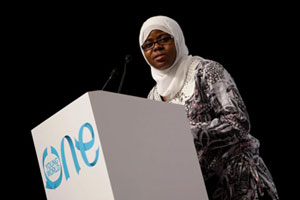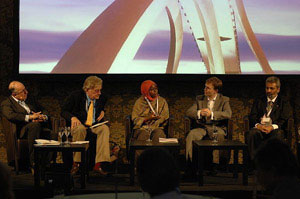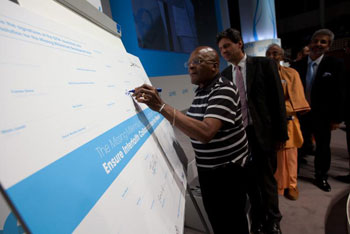Alumna Ajarat Bada Travels the World Spreading Peace
July 29, 2013
 At just 27 years old, Drexel College of Nursing and Health Professions alumna Ajarat Bada has traveled across the globe spreading her mission to ensure interfaith collaboration for peace.
At just 27 years old, Drexel College of Nursing and Health Professions alumna Ajarat Bada has traveled across the globe spreading her mission to ensure interfaith collaboration for peace.
Her project, The Missing Millennium Development Goal, has attracted the attention of the United Nations, Vanity Fair, The New York Times, and several world leaders including South African social rights activist Desmond Tutu, Grameen Bank founder and Nobel laureate Prof. Mohammed Yunus, Unilever CEO Paul Polman and Live Aid Band Aid founder Bob Geldof.
Before Bada developed her peace initiative, she was an international student from Nigeria living in Sacramento California and attended Drexel’s BSN 5 year Co-op Program. Upon graduation in 2008, Bada moved to a Los Angeles to work in the Cedars Sinai Medical Center. She decided to go back to school at Loma Linda University in 2009 to work toward her Master’s degree in Public Health with an emphasis on global health. Bada was on-track to graduate in 2010 and go on to medical school until she was chosen to speak at the “One Young World” youth leadership conference in London, England and her life was changed forever.
The conference is “where young people start becoming leaders.” Bada was asked to speak about the United Nation’s Millennium Development Goals (MDGs) in the conference’s global health panel. The Millennium Development Goals are eight international development goals that were officially established by the United Nations in 2000 following the Millennium Summit. The global health panel at which Bada spoke allowed young delegates from all over the world to discuss the UN’s MDGs and talk about solutions and ideas. “It was an electrifying moment for me,” she said.
After coming home from the conference, Bada came up with the idea to develop a 9th Millennium development goal. “The Millennium Goals were not being achieved,” Bada said. “A lot of countries were missing targets,” she continued.
According to Bada, there is not enough money to support the UN’s MDGs because a lot of money is spent on religious wars. “There is a lot more money spent doing that and a lot less money left for aid,” she said. “The countries themselves who are actually in war are not able to prosper. All the money and resources go to war. People die in war which doesn’t aid productivity.” Developed countries, such as the United States, are spending too much money on war when they could be giving money for aid to achieve the eight Millennium Development Goals, she said.
 Bada wrote down her idea to ensure interfaith collaboration for peace via a 9th Millennium Goal, calling it “The Missing Millennium Development Goal,” and sent it to people she had met at the conference. The goal was “to unequivocally commit to deliver peace amongst nations, races and creeds.” Her ideas caught on and she was introduced to the United Nations. “I didn’t expect that it would take on that much momentum,” she said.
Bada wrote down her idea to ensure interfaith collaboration for peace via a 9th Millennium Goal, calling it “The Missing Millennium Development Goal,” and sent it to people she had met at the conference. The goal was “to unequivocally commit to deliver peace amongst nations, races and creeds.” Her ideas caught on and she was introduced to the United Nations. “I didn’t expect that it would take on that much momentum,” she said.
She presented her goal to the United Nations Alliance of Civilizations (UNAOC). This arm of the UN was established after September 11th to create an alliance of civilizations to improve understanding and cooperative relations among nations and peoples across cultures and religions. The organization also helps to counter the forces that fuel polarization and extremism. The UNAOC has an annual forum every year, bringing together a network of political and corporate leaders, civil society activists, youth leaders, journalists, international organizations and religious leaders. She presented at the May 2010 conference in Rio and it was her first experience at the UN. “People were really impressed,” she said. “A lot of the governments and people took our cards.”
The Missing Millennium Development Goal team was next invited to the international day of peace at the United Nations on September 21, where they presented their project again. They were offered internships at the UN Economic and Social Council “to be able to meet new people and come and talk about the project,” she said. Bada was able to discuss her project with different arms of the United Nations and discuss the future of the missing goal.
The project had turned from the seed of an idea into a movement. The team first had to collect signatures of people who supported the idea. Bada and her cohort traveled all around the world to collect signatures for their cause including that of Desmond Tutu.They were invited to come back to the UNAOC conference in 2011 in Doha, Qatar to talk about their progress from the previous year. Their next step was to present about implementation. “There are many great ideas, but you have to implement them,” Bada said.

Since the UN’s MDGs were set to expire in 2015, the team was unable to officially add their goal. This roadblock didn’t stop Bada. The team developed an initiative called the Blueprint which will provide an indicator for the targets of the Missing Millennium Development Goal. It will provide a set of common objectives, principles and best practices for a multi-stakeholder approach to interfaith collaboration as a tool for development. As academic, media, business, government and religious stakeholder groups work on promoting interfaith understanding by following the effective road-map provided by the Blueprint, they will ultimately bring the promotion and appreciation of religious diversity to life at a local, national and international level. The team presented their Blueprint in an academic setting (to professors at Oxford University, Birmingham), members of the media, government (U.S. Special Envoy to the OIC), business (Unilever CEO Paul Polman) and a few others at private roundtable discussions where they received a lot of valuable feedback.
In 2012, the United Nations released the plan for creating Sustainable Development Goals which would build off of the Millennium Development Goals and carry on their ideas when they expire in 2015. Bada and her team are currently writing a proposal to get her initiative considered to be listed as one of the new Sustainable Development Goals.